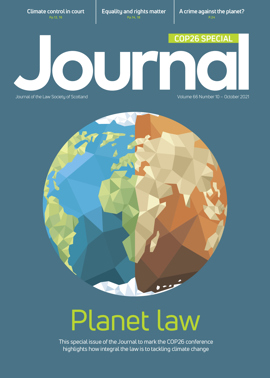Editorial: Climate climax
Most likely we are about to enter a period of saturation coverage of climate change matters, as the COP26 global conference in Glasgow finally opens. This issue of the Journal, produced in collaboration with the Society’s Working Group on COP26 and Climate Change, recognises the significance of the occasion with a spread of features highlighting the many legal facets of the subject.
Climate change is far from being the preserve of scientists or politicians. The more you look, the more you realise just how inseparable the law and legal rights are from the whole issue. We are, after all, talking about threats to the livelihoods, and therefore possibly the lives, of whole communities or even peoples. If a commitment to human rights means anything, it means standing up for those who are often least to blame for the predicament in which they find themselves, but have most to lose from what humanity is doing to the planet.
Of course there are many other ways in which the law can play a part, from regulating activities with a direct environmental impact, to holding corporations or even governments to account for alleged failures to comply with legal duties, sometimes of their own devising. And as is apparent from our features on climate change litigation, activists are determinedly pursuing an array of lines of challenge in the attempt to enforce more rigorous action against global warming.
One way or another, therefore, lawyers are going to find themselves increasingly drawn into advising, whether on the rights of those adversely affected, the possibilities for enforcing a change in policy or practice, or the risks of being subjected to a claim.
If that is the case, it should be something to welcome, and not just from a business planning point of view. Human rights is, regrettably, still something treated with suspicion, if not outright hostility, by a substantial section of the public, encouraged even more regrettably by members of the UK Government. If the law and lawyers can be presented, and recognised, as nothing less than integral to saving the planet, a long overdue change in attitude, and greater respect, may follow.
There may be a further role to play. It is at least conceivable that, as more stringent measures are found to be necessary to meet increasingly strict emissions targets, governments will seek to direct our lives to an ever greater extent. If that should happen, lawyers will be sought to stand up in defence of individual freedoms. How that would play out against a global emergency can only be speculated at present, but there may be lessons from the emergency from which we are just emerging. We are always learning.
Regulars
Perspectives
Features
Briefings
- Criminal court: ID from CCTV
- Criminal court: Justiciary Office briefing
- Licensing: Passport to confusion
- Planning: COVID and NPFD update
- Insolvency: Winding up easier, but hurdles remain
- Tax: Government continues to bring in new taxes
- Immigration: Asylum from the Taliban?
- OPG: Update
- Property: Common parts – a welcome clarification
- In-house: Lawyer with natural energy






